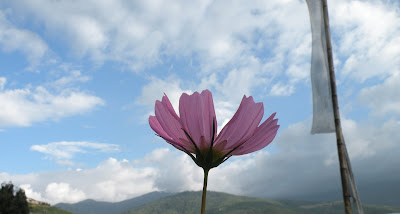The essay below won me the second prize in the non-fictional essay writing competition organized by the Bhutan Centre for Media and Democracy, UNDP, and UNDEF for the celebration of the fourth International Democracy Day today:
“Citizenship is an articulation of an inclusive political association and common culture that unites all inhabitants of diverse ethnicity, religion or race…The state is an association of citizens, all free and all have the same rights and carry respective duties.”-Feliks Gross (1999), the American Sociological HumanistThe Bhutanese public was, to a large extent, primarily conservative, traditional and apolitical. Bhutan’s transition was initiated, planned and controlled solely by the Kings. There was neither external pressure from the outside world on Bhutan to democratize, nor have there been any internal demands for greater participation for the people. However, since 1998 the fourth Druk Gyalpo King Jigme Singye Wangchuk guided the country to rapid transition to democracy. Every major activity was geared towards people empowerment, decentralization and people’s participation. And in 2008, the country became a constitutional democratic monarchy.With democracy gifted from the royals, the Bhutanese publics are bestowed with greater, newer and important rights and responsibilities to determine our own political, economical, social and cultural system. From apolitical, passive and dependant populace we are driven to active, well formed and responsible citizens.The Constitution of the Kingdom of Bhutan was adopted and it has granted certain legal and fundamental rights to all its citizens like freedom of speech and assembly, rights to press, property rights and to one’s own religion and culture. Also, certain social and political responsibilities have been granted such as rights to participate in the exercise of political power-whether as a voter, a candidate or public officials.However, citizenship is more than this in a new democratic Bhutan. It is encompassed by normative principles, values and expectations that all derive from social, economical, historical and cultural context of the times. It is a higher responsibility to live united and achieve everything as one harmonious family.On the National Day, His Majesty the King Jigme Khesar Namgyal Wangchuk declared to the nation: “Today we have great aspirations-the peace, stability, security and sovereignty of the nation; strengthening of our new democracy; equitable socio-economic growth to achieve GNH and; nurturing our youth to one day lead a nation greatly strengthened by our hard work and commitment. To achieve all this we need trust and faith in our relationships-between the government and people; between institutions of government and; between people ourselves.” It is very clear from the National Day’s address that the concept of citizenship in a democratic Bhutan is to promote cooperative living. Individuals or groups or agencies with different interests and opinions are obliged to sit down with one another, have dialogue, negotiate and support each other.In 2008, we elected the government which serves the people. But the citizenship role is much broader than just taking part in the democratic processes and choosing leaders to foster vibrant democracy.As Marina Liborakina, a Russian activist stated, “As citizens, we are responsible for how we are governed. The main issue is…to broaden citizens’ participation…especially in decision making on crucial issues of security, peace, and military.” Citizenship, thus, means a right to participate actively in public management which is of great significance for our country which is in the process of creating a modern, political and economic system. Well informed, adequately and timely consulted citizens taking part in the direct decision-making can fully contribute to sharing of responsibilities with the representatives, planning and working together.Debating public issues, attending community meetings and petitioning the government are some other rights and responsibilities of the citizens. Public debate provides an opportunity for every individual to discuss all local issues and to critically re-examine them for the purpose of finding adequate solutions. Moreover, non-governmental organizations can assist the government offering citizens especially members of sensitive groups such as youth, women and disabled person a platform to voice their concerns and include them into the governmental process.Besides, social media networks such as Facebook, Twitter and blogs are further facilitating the citizens’ freedom of speech. It provides accessible channels for the citizens to take active part in the governance of their country where people voice their opinions on development and raise pertinent questions for the exchange of knowledge and experience on development issues.To define and limit the government’s power and hold them accountable, the Constitution and other constitutional bodies like the Election Commission of Bhutan and the Anti-Corruption of Bhutan are established.In general, citizenship demands us to be concerned and to care about the world around us and then act on the problems. From nurturing our environment, protecting it from exploitations, we are to raise issues relating to negligence of underprivileged and fighting against indiscriminate and injustice in our society. We have duties and the responsibilities to care and respect for other fellow citizens, their cultures and ideas. As we love our country and abide by law, in return the state upholds its right to defend our rights.However, citizenship is not limited to one’s country. We are also the citizens of the international community as we have been bestowed with human rights and a voice in international matters that affect us. We have responsibility to care about other citizens of the world and to have an understanding of their cultures, histories and ideas. In a global world, we live in an interconnected world with crucial transnational dimensions and it is citizens’ responsibilities to be informed on how geopolitical realities shape life today.In conclusion citizenship is a common culture that unites all the citizens of diverse ethnicity, gender, religion and interests where they have the same rights and respective duties to carry irrespective of who we are. Citizenship builds a strong civil society (even global) marked by harmony, understanding, cooperative living and trust to achieve our aspirations and find peace, economic prosperity and GNH.











